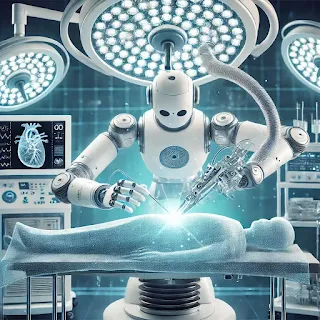The Future of AI in Healthcare: Transforming Medicine and Patient Care
- Get link
- X
- Other Apps
The Future of AI in Healthcare: Transforming Medicine and Patient Care
Introduction
Artificial Intelligence (AI) is revolutionizing healthcare, transforming
everything from diagnostics to treatment and patient management. With
AI-powered technologies such as machine learning, natural language processing,
and robotics, medical professionals can improve accuracy, efficiency, and
patient outcomes. This article explores the major ways AI is shaping the future
of healthcare and what this means for patients and doctors alike.
📌 Table of
Contents
- AI in Medical
Diagnosis
- AI-Powered Drug Discovery
- Virtual Health
Assistants
- AI in Robotic
Surgery
- AI and
Personalized Treatment Plans
- The Ethical
Concerns of AI in Healthcare
- Future Outlook
of AI in Medicine
- Conclusion
- References
1. AI in Medical Diagnosis
One of the most promising applications of AI in healthcare is medical
diagnosis. AI algorithms analyze medical images, detect abnormalities, and
assist doctors in diagnosing diseases faster and more accurately.
🔹 Key Examples:
- Radiology: AI models can
analyze X-rays, CT scans, and MRIs with precision.
- Pathology: AI detects
cancerous cells in biopsy samples more accurately than humans.
- Cardiology: AI identifies
heart diseases early by analyzing ECG data.
 |
| AI analyzing an X-ray scan for accurate diagnosis |
💡 Case Study:
Google’s DeepMind developed an AI model that diagnoses eye diseases from
retinal scans with an accuracy comparable to top ophthalmologists.
Comparison of AI vs. Human Diagnosis
|
Medical Field |
|
Human Accuracy (%) |
|
Radiology |
94% |
87% |
|
Dermatology |
91% |
85% |
|
Cardiology |
95% |
89% |
2. AI-Powered Drug Discovery
Developing new drugs is a lengthy and costly process, but AI accelerates
this process by predicting drug interactions and identifying promising
compounds faster.
🔬 Key AI
Contributions:
- Identifying
potential drugs by analyzing vast biomedical data.
- Predicting side
effects before clinical trials.
- Speeding up
vaccine development (e.g., AI-assisted COVID-19 vaccines).
 |
| A robotic surgical system assisting doctors in an operating room |
💡 Example:
AI-powered platforms like BenevolentAI and Atomwise are revolutionizing drug
discovery, cutting development time significantly.
3. Virtual Health Assistants
AI-driven virtual health assistants (VHAs) provide 24/7 healthcare
support by answering medical queries, reminding patients about medications, and
even scheduling doctor appointments.
🔹 Examples of
VHAs:
- Chatbots like
Ada and Buoy Health diagnose common symptoms.
- AI-powered
voice assistants like Alexa and Google Assistant offer basic
health advice.
.webp) |
| AI analyzing patient data to create a customized treatment plan |
💡 Impact:
Reduces the burden on healthcare providers and ensures patients receive timely
medical guidance.
4. AI in Robotic Surgery
AI-powered surgical robots enhance precision and minimize risks during
complex surgeries. These systems assist surgeons by providing real-time data
and executing highly precise movements.
🔹 Key Benefits:
✅ Reduced surgery time and errors
✅ Less invasive procedures, leading to
faster recovery
✅ Enhanced precision beyond human
capability
💡 Example: The da Vinci Surgical System assists surgeons in minimally invasive procedures with unparalleled accuracy.
5. AI and Personalized Treatment Plans
AI analyzes patient data to create personalized treatment plans based on
genetics, lifestyle, and medical history. This helps doctors tailor therapies
for maximum effectiveness.
🔬 Applications:
- Cancer
Treatment: AI identifies the best chemotherapy or immunotherapy based on a
patient’s genetic profile.
- Diabetes
Management: AI-powered apps monitor glucose levels and suggest lifestyle
adjustments.
💡 Example: IBM
Watson for Oncology recommends customized cancer treatments based on thousands
of medical records.
6. The Ethical Concerns of AI in
Healthcare
While AI brings numerous benefits, ethical challenges must be addressed:
🔹 Major Concerns:
🚨 Data Privacy:
Protecting patient data from cyber threats.
🚨 Bias in AI:
Ensuring AI models are trained on diverse data sets.
🚨 Doctor-Patient
Trust: Patients may hesitate to trust AI-based decisions.
💡 Solution:
Implement strict regulations and ensure transparency in AI-driven medical
decisions.
7. Future Outlook of AI in Medicine
AI is expected to further integrate with healthcare, leading to
advancements such as:
🔮 AI-powered
hospitals with fully automated systems
🔮 Real-time disease
outbreak prediction
🔮 AI-driven
prosthetics with brain-computer interfaces
💡 Final Thought:
AI is not replacing doctors but enhancing their ability to provide better care.
8. Conclusion
AI in healthcare is no longer a futuristic concept—it is transforming
medicine today. From early disease detection to robotic surgeries and
personalized treatments, AI is revolutionizing how we approach healthcare.
However, ethical considerations and data privacy must be prioritized to ensure
responsible AI deployment.
🌟 Key Takeaways:
✔ AI enhances diagnostic accuracy.
✔ AI-driven drug discovery speeds up
medicine development.
✔ Robotic surgery improves precision.
✔ Personalized AI-based treatment leads
to better outcomes.
9. References
- Rajpurkar, P.,
et al. (2018). "Deep Learning for Chest Radiograph Diagnosis." Nature
Medicine.
- Topol, E.
(2019). Deep Medicine: How Artificial Intelligence Can Make Healthcare
Human Again. Basic Books.
- Esteva, A., et
al. (2017). "Dermatologist-level classification of skin cancer with
deep neural networks." Nature.
- Get link
- X
- Other Apps




Comments
Post a Comment